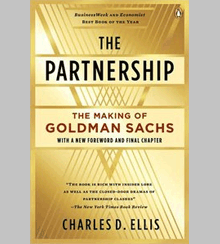Goldman’s “We”-Conscious Culture
Greg Farrell, author of Corporate Crooks: How Rogue Executives Ripped Off Americans...and Congress Helped Them Do It!, highlights the cohesive corporate culture at Goldman Sachs that is on view in The Partnership: The Making of Goldman Sachs, by Charles D. Ellis.
Everybody has a theory about what makes Goldman Sachs such a successful investment bank. Some attribute the firm’s gravity-defying performance to a secret network of well-placed government officials eager to do Goldman’s bidding; others believe that Goldman has access to information that other banks don’t, giving it an advantage in the capital markets. Many competitors simply concede that when it comes to trading, Goldman stands above its peers. But the following passage, from Charles D. Ellis’s book The Partnership: The Making of Goldman Sachs (Penguin Press, 2009), captures a different element of Goldman’s “special sauce”: its culture. Many companies claim that their employees work together self-effacingly for the good of the whole. At Goldman, that’s actually true. The single most significant management lesson that its partners learn is the importance of the pronoun “we” — as this story about Robert Rubin, who led the firm in the early 1990s, shows.
— Greg Farrell, Wall Street correspondent for the Financial Times and coauthor of Corporate Crooks: How Rogue Executives Ripped Off Americans...and Congress Helped Them Do It! (Prometheus Books, 2006)
Excerpt from The Partnership: The Making of Goldman Sachs, rev. ed., by Charles D. Ellis
“Frank, could I see you for a minute?” [Robert] Rubin had followed [Goldman Sachs] partner Frank Brosens out of a management committee meeting. The meeting had been a triumph. Brosens had presented a compelling case for a bold commitment to arbitraging Japanese equity warrants, and the committee had strongly agreed with his recommendation. Brosens had made the entire presentation, but, as a learning experience, he had invited Zachary Kubrinick to sit in on the meeting as an observer. Brosens knew he’d had all the bases covered and all the facts clearly in hand, but he could hardly believe Rubin had been so impressed that he would leave the meeting to compliment him immediately. Brosens was right; Rubin was not rushing to compliment him on his performance.
“Frank,” said Rubin in his soft, relaxed voice, “you and I both know that, as young as he is, Kubrinick knows all that you know about Japanese warrants and he could have made the case equally well. You really should have let him make the case — and get the experience of coming before the management committee. By not taking the credit, you become more effective. If you do right by people, they win and you win. Frank, always go out of your way to share credit.”
When Brosens had first been put in charge of arbitrage, he had one exciting talent in the division — Eric Mindich, a man in his early twenties whom he wanted to put in charge of risk arbitrage for the firm’s own account. Silfen and Zuckerberg wondered about assigning so much responsibility to such a young star. “Last year was a tough year in arbitrage. Shouldn’t you focus more on this area yourself?”
“I believe with a hundred percent of his time, he can do better than I can do with forty percent of my time.”
Rubin joined in: “Age is irrelevant. By expanding his responsibilities now, you may keep a real star that you might otherwise lose.”
Mindich soon became the youngest-ever partner of Goldman Sachs, at age twenty-seven.
— Charles D. Ellis
Excerpt reprinted by arrangement with The Penguin Press, a member of Penguin Group (USA) Inc. Copyright © 2009.




